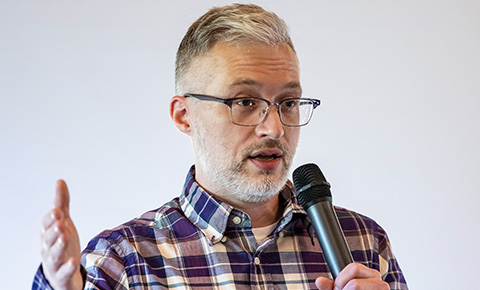David Rapp: 'Reading Made Me Who I Am'

When David Rapp was in high school, he worked in one of his favorite places in the world: The public library. There, the teenager was put in charge of literary classics, magazines, science fiction, and humor sections, all genres he still adores.
“Reading is what made me who I am,” said Rapp, who traced his academic journey during his spring investiture ceremony in Annenberg Hall, an honor bestowed on Northwestern University’s most outstanding researchers and instructors. “And reading is what informs my research.”
Rapp, the Walter Dill Scott Professor of Learning Sciences at Northwestern’s School of Education and Social Policy, has taken his love of books and reading to a new level through his multidisciplinary work on comprehension. An expert on the effects of misinformation on people’s thoughts, group behaviors, and policy decisions, his work centers on the processes behind memory, language, comprehension, and learning.
Some of his most timely research—started a decade before it was a major national problem— examines how people get and use information, including why they rely on misinformation, even when they know better. The more confident people are about what they know, Rapp says, the more likely they are to fall victim to inaccurate information.
“This is a problem when they are also the least willing to contemplate alternatives,” he said.
Rapp, a first-generation college student, was born in Australia and raised in Queens, N.Y., by a single mom and grandparents in an immigrant household. As a high school senior, he had the opportunity to take psychology and sociology courses at the City of New York’s Queens College, which stoked his interest in both subjects.
Though he wasn’t initially sold on being an academic, he blazed through his courses, earning his master’s degree in one year at New York University (where he, naturally, fell in love with the library) and his doctorate in experimental psychology at the State University of New York in Stony Brook four years later. His doctoral work examined reading comprehension, including how people build meaning from fiction and non-fiction sources.
He also completed a unique post-doctoral fellowship in both classics and psychology at Tufts University with mentors who studied spatial cognition and visualizations.
At the University of Minnesota, where he landed his first faculty position, Rapp began studying why some children have difficulty understanding what they’ve read and building interventions to help.
“I became enamored with the idea that my work could be done in collaboration with other researchers and communities, and I could do projects with impact,” he said. “It introduced me to a new world.”
From Minneapolis to Evanston
In 2006, the School of Education and Social Policy was looking for a unique type of faculty member: one with expertise in both psychology and education. Rapp was hired and became one of the first of many scholars in the School with expertise in multiple fields.
At the time, few people were studying misinformation, but Rapp saw it as a crucial area of research. He wanted to know how people are influenced by fake news and how they can protect themselves.
“My early work was about how do we help readers get better,” he said. “Now it's about how we help people become better evaluators, which involves reading. Many researchers, including folks at NU, were making important strides in understanding how to overcome misconceptions. I wanted to extend that to understand how misconceptions develop, through media experiences or social interactions or personal decisions.”
At Northwestern, Rapp runs the Reading Comprehension Lab, which conducts cognitive-based research on learning, reading, and memory. He was named SESP’s Outstanding Professor in 2019 and was named a Charles Deering McCormick Professor of Teaching Excellence, Northwestern's highest teaching award.
“David is a leader in his field and brings distinction to Northwestern with this scholarship,” said Provost Kathleen Hagerty. “Truly his contributions and commitment to the profession have made our institution one of the great universities in the world.”
A journal editor and prolific researcher, he also has served on the board of several organizations, including Reading With Pictures, which advocates using comics in the classroom and beyond to promote literacy.
Rapp’s books include the co-edited volumes Processing Inaccurate Information: Theoretical and Applied Perspectives from Cognitive Science and the Educational Sciences, and The Handbook of Discourse Processes.
He received a McKnight Land-Grant Professor award from the University of Minnesota, the Tom Trabasso Young Investigator Award from the Society for Text & Discourse, and is a Fellow of the Association for Psychological Science and American Psychological Association.
Though Rapp initially thought he might be a comic book artist, based in part on his love of Spiderman, he’s found his niche in a multidisciplinary school, surrounded by psychologists, political scientists, economists and learning scientists. He’s also maintained his love of libraries: When he can, he drives off campus to visit and use a public library as his office for the day.
He lauds Northwestern as an amazing place to develop interests and contribute to both theory and practice. “The work I’ve tried to do is aspirational,” he said. “That's a function of what I see my colleagues doing, and how amazing they are in their research."
Related Content:
- Both Sides Now: SESP Magazine
- David Rapp explores how best to combat misinformation: American Psychological Association
- Five Things About David Rapp
- The Dangers of ‘Balanced’ Climate Change Reporting